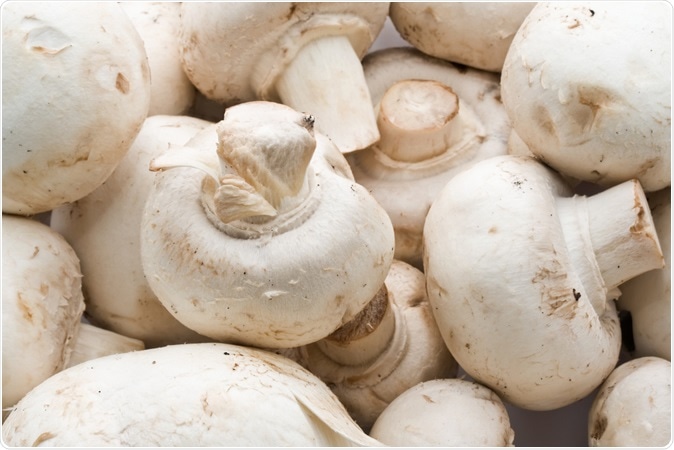A researcher team from Penn State has found mushrooms to contain high levels of two antioxidants that could promote good health and also lead to anti-aging benefits. The results of the study were published in the latest issue of Food Chemistry.
Mushrooms have high amounts of the ergothioneine and glutathione – both antioxidants, said Robert Beelman, professor emeritus of food science and director of the Penn State Center for Plant and Mushroom Products for Health. Different species of mushrooms contain different amounts of these two antioxidants. He explained that mushrooms are the richest source of these two antioxidants and some are really rich in these.

Image Credit: Champignon mushrooms. Sailorr / Shutterstock
Antioxidants are also found in other foods such as egg yolk, liver, beans, oat bran etc. Mushrooms still remain the richer source Beelman said. Beelman explained that as the body broke down food to produce energy it releases certain chemicals called free radicals. These can lead to a condition called oxidative stress.
Oxidative stress due to these free radicals containing unpaired electrons can damage cells and the DNA leading to several diseases and even cancers, dementia, Alzheimer’s disease, Parkinson’s disease and coronary heart disease. This is because these free radicals are highly reactive and they can travel throughout the body to pair up with electrons. Free radicals are also associated with accelerated aging, inflammation and age related damages. The body can be protected from these free radicals with antioxidants.
The study looked at 13 different species of mushrooms to check for the amounts of the antioxidants - ergothioneine and glutathione in them. They noted that porcini species, a wild variety, contained the highest amounts of the two compounds. Beelman said that the species is popular in Italy calling searching for this mushroom a “national pastime” there! White button mushrooms, that are most commonly consumed, contain similar antioxidants but in lesser amounts he added.
The study further showed that those mushrooms that contained more glutathione were also high in ergothioneine. Beelman also added that cooking does not spoil the antioxidant compounds because ergothioneine for one is very stable in heat.
Beelman called for further research that would see if consuming these mushrooms for long periods of time could protect patients from neurological diseases sich as dementia, Alzheimer’s disease, Parkinson’s disease etc. One indication of benefit, he noted, was the fact that people living in France and Italy had lower incidence of these neurodegenerative diseases compared to those living in the United States. This could be because the former consume more of these mushrooms. This could be “causative” or a “correlation” he said and needs to be explored. He added that the average difference in mushroom consumption between these countries is around “3 milligrams per day, which is about five button mushrooms each day.”
The study was conducted by Beelman along with Michael D. Kalaras, postdoctoral assistant in food sciences, John P. Richie, professor of public health sciences and pharmacology and Ana Calcagnotto, research assistant in public health sciences.
Reference: http://news.psu.edu/story/491477/2017/11/09/research/mushrooms-are-full-antioxidants-may-have-antiaging-potential